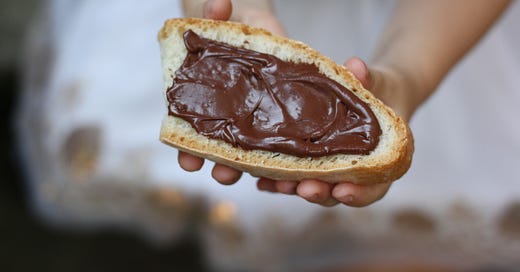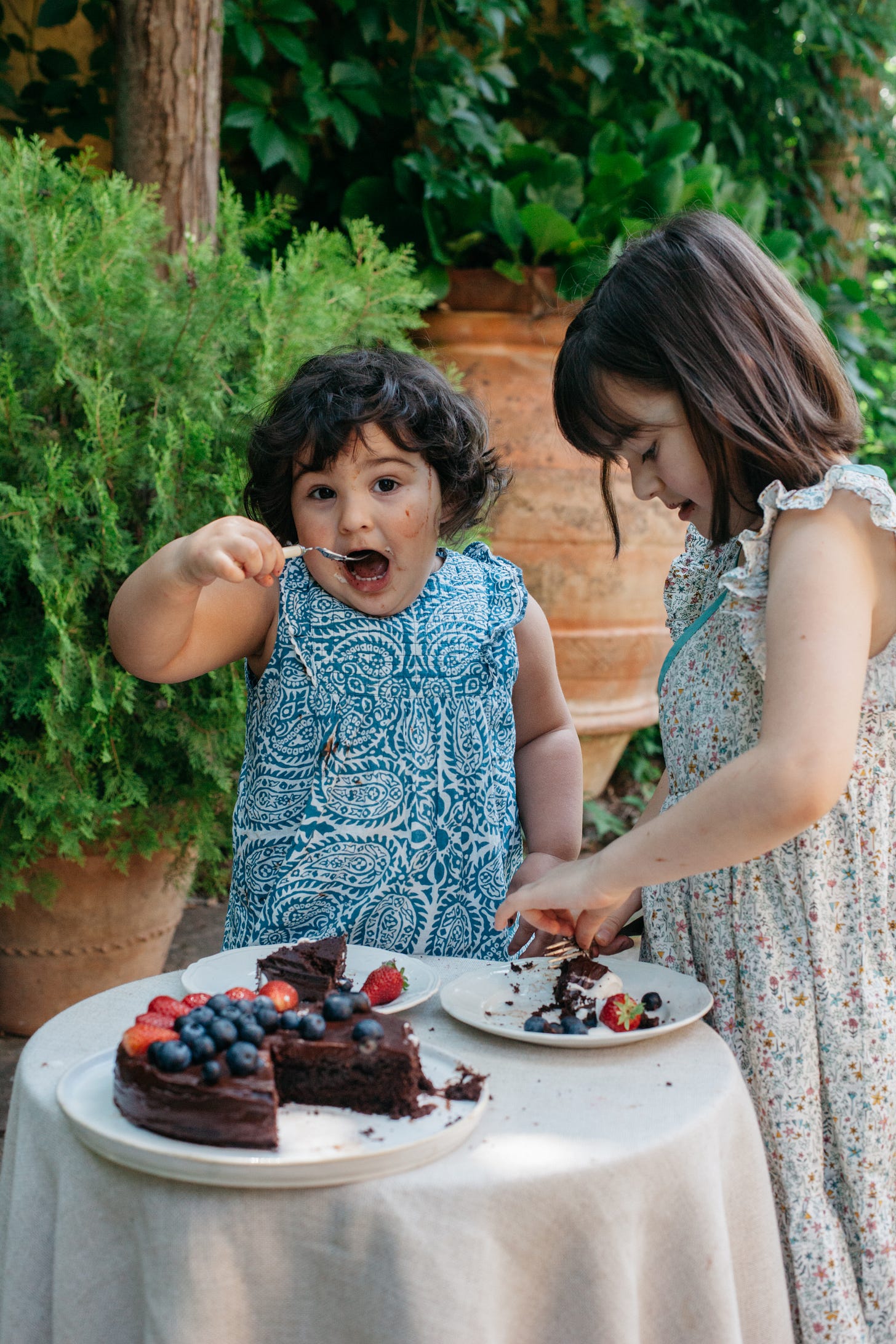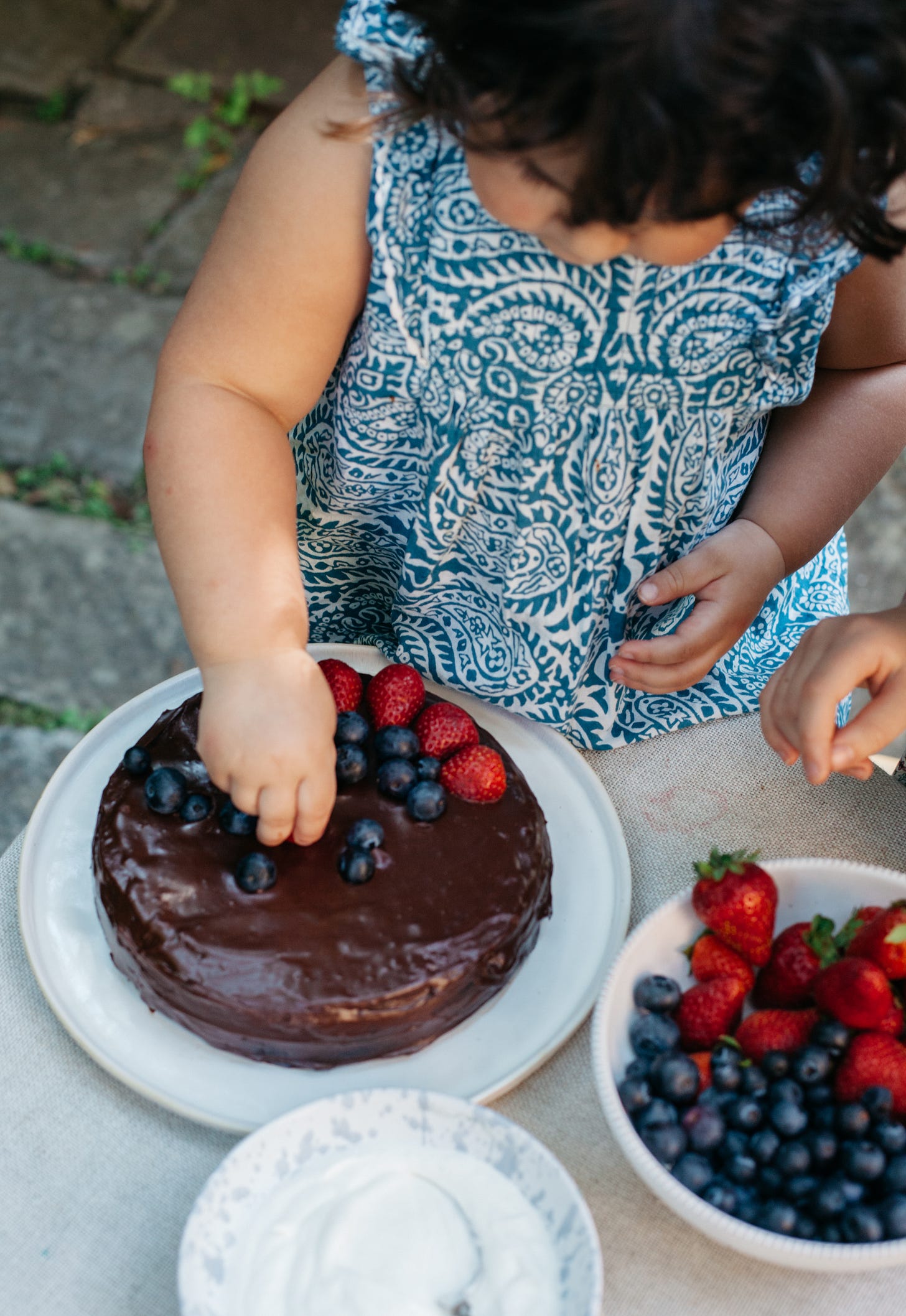Maybe it’s the chocolate overload this time of year that stresses out parents so much, but I had an argument with a person very dear to me that began (like many silly arguments) about something harmless and banal: a quip about sugar highs. Apparently not everyone has received the memo from the 1980s and then again in 1994 that the myth that sugar causes hyperactivity has been well and truly debunked.
The Easter bunny has truly outdone themselves and the house is full of chocolate, the kids are running all over the place and very excited. Like other holidays and birthdays or celebrations where there are lots of sweet on offer, I just want to assure you, it will be ok. It can even be more than ok.
To be clear, I’m not an expert, I am just a food writer, a mother and an advocate of finding joy in food. I’m not saying that that means you should go and eat all your Easter eggs in one go. I’m just saying you don’t need to worry that sugar is going to make you “high” because that is not how the science works. And I listen to the real experts on these things.
When sugar it was first introduced by the Arabs to Europe in the Middle Ages, it was considered a very special, highly luxurious item to be used sparingly. It was kept in pharmacies and used medicinally — in twelfth century England it was used to treat a wide range of illnesses, from stomach problems to chapped lips. Its use grew in popularity throughout the following centuries (if you are curious to read more about the history of sugar and how it has shaped the world, take a look at anthropologist Sydney W. Mintz’ Sweetness and Power: The Place of Sugar in Modern History).
In medieval texts you find recipes of specific spice mixtures combined with sugar to make them more palatable (to quote Mary Poppins, a spoonful of sugar helps the medicine go down), like this text from around 1075-1100 describing a rose and sugar concoction to help tertian fever, note the word zuccari, similar to modern Italian, zucchero, sugar, which comes from Arabic, sukkar, and the Persian, šakar.
The sugar, it seems, did not have so much an effect on the body as some of the spices did (many were well known — and still are — for their digestive properties for example), so much as it made patients feel better because, well, to put it simply, it made them happy.
Sweets bring us joy and that is why we love them so much. But sugar today has a bad wrap. We are told we should feel guilty about consuming it in any form, that it may increase risk of Type 2 diabetes and heart disease, that it will somehow change our behaviour. The language surrounding sugar is similar to how we talk about drugs, being on a “high”, a sugar “addiction”. But does sugar really have this affect on us? Not really.
As Richard Klasco MD, a Harvard graduate and emergency medicine physician, writes for the New York Times, the myth began with a 1922 theory that sugar intake could create “a neurotic child” but didn’t actually take hold in the public’s imagination until the best-selling 1975 book, Why Your Child is Hyperactive suggested sugar as the reason why one boy in a case study “also seemed to go completely wild after birthday parties and during family gatherings around holidays.” Some say the Feingold diet, popular in 1973, could be to blame too, it called for “the removal of food additives, such as dyes and artificial flavors, from children’s diets because they might lead to hyperactivity. Although this special diet did not originally mention sugar, sugar became grouped under the category of food additives due to the common belief that it affected behavior.” (Huynh, 2010)
Despite the fact that the myth was debunked 30 years ago by an “extraordinarily rigorous study by the New England Journal of Medicine,” as Klasko writes, where urine, and various cognitive and behavioural performance were all tested, the latter two at 5 second intervals, to the conclusion that “there is no evidence that sugar alone can turn a child with normal attention into a hyperactive child” (you can read this whole study on the National Library of Medicine website by the way), the myth persists. But why?
In this article from Yale Scientific, Does Sugar Really Make Children Hyper from 2010, Nancy Huynh MD discusses the many studies done to try to get to the bottom of this question, suggesting that the myth is psychological:
“In 1982, the National Institute of Health announced that no link between sugar and hyperactivity had been scientifically proven. Why, then, does this myth still persist? It may be mostly psychological. As previously stated, experimentation has shown that parents who believe in a link between sugar and hyperactivity see one, even though others do not. Another possibility is that children tend to be more excited at events like birthday and Halloween parties where sugary foods are usually served . People may have confused proximity with correlation although the environment is probably more to blame than the food.”
And before you shout, “But I’ve seen it with my own eyes, my child gets hyperactive after having sugar!” You should read about the study done in 1994 on 35 boys aged 5-7 for the Journal of Abnormal Child Psychology, which showed that parents who simply believe that their child’s behaviour is affected by sugar will perceive their child to be more hyperactive when led to believe their child had a sugary drink. In the study, the parents were told there would be a control group which was given a placebo and the others would be given a sweet drink. Spoiler alert: they were actually all placebos.
This isn’t to say that sugar is now a free for all — but let’s not feel guilty! You can let go of restricting it and worrying about it so much and everything will still really be ok (more on this in a moment). Let’s listen to the science here, the same science that has been telling us since 1982, that this ingredient isn’t causing your child to get excited or change behaviour (or us to “crave” a “sugar hit” at that 4pm slump), our worried minds might be making it all up.
This article on BBC Future, which is already 4 years old, is a really interesting deep dive into the murky waters of whether sugar really is a threat to our health at all. It’s long but worth a read and explains why we actually don’t have enough evidence to say for certain that sugar alone causes obesity, Type 2 diabetes or heart disease — and introduces the studies that show the many positive effects of sugar on our bodies.
Singling out sugar and demonising of it is really not the answer. It’s never the answer when one ingredient gets cut out of our lives — be it butter, fat, carbohydrates or whatever else is the current trend. This is a really sad way to live life if you ask me (or don’t ask me, ask the countless qualified, certified experts who are anti-diet) and can be even dangerous when you bring up children and young people to think this way.
The takeaway from this? That we shouldn’t be perpetuating myths or demonising one food or ingredient, or teaching our children to. Food shouldn’t be categorised into “good” or “bad”. This is a steep and slippery slope to go down, one far more dangerous than an Easter egg.
So should you just let yourself or your kids go to town on the entire basket of Easter eggs? No. But maybe don’t be so worried or restrictive about it. Have you ever tried this? I have and it is eyeopening and incredibly empowering to put trust in yourself and your children.
Restricting food (or really anything) only makes it more appealing — to read more about this I thoroughly recommend going to listen to/read this piece from Virginia Sole-Smith (the author of The Eating Instinct: Food Culture, Body Image and Guilt in America) for her podcast Comfort Food, which is about feeding families and taking a non-restrictive, anti diet approach, “The more you feel like you don’t have permission to eat it, the more fixated on it you will be, and the more you will crave it.”
So much of this piece hit home for me, as the mother of a child who had several years of difficulty eating and a fear of food and the mother of another, bigger bodied child who people judge only by looking at her, as does so much of Virgina’s writing in general but here’s a snippet:
“Just saying to kids, “I want you to eat more fruits and vegetables” makes the fruits and vegetables less interesting. We can put in the show notes the famous study done by the iconic food researcher Leann L Birch, where they told half the kids in the study that they could have as much soup as they wanted, and then have dessert. And then they told the other kids you have to finish your soup before you’re allowed to have dessert. The kids who had to finish their soup, both ate less of it and liked it less than the kids who were allowed to self regulate between all the foods on offer. It’s a really powerful piece of research and it’s been replicated many, many times. It really showed that primary human psychology of feeling limited makes you crave it more. That is why this cannot be the way we approach nutrition with our kids.”
There is a part of Virginia’s introduction to her book that asks about our modern, dysfunctional diets and obsession over “clean eating” and other fixations: “How did we learn to eat this way? Why is it so hard to feel good about food? And what does it mean to learn to eat again in a world that’s constantly telling us not to eat?”
And this takes me back to what I started writing that is so often overlooked because we are too busy worrying: sweets can bring us joy and comfort.
A chocolate egg can put a smile on your face.
A deep waft of still-warm apple cake (or insert that dessert that does this to you) can take you spinning into deep nostalgia for a place or person you can’t see.
Baking chocolate chip cookies with your children, one of them standing on tiptoes to peer into the bowl, the other cracking the egg, can make your heart burst with pride and create a beautiful bond and memories that they’ll carry for a lifetime.
That tiramisu that nonna makes that is never missing from the table on those special family lunches.
A beautiful homemade birthday cake made by my self-declared cake hating/non baker husband.
A loaf of banana bread taken to a sick friend.
A jar of freshly made marmalade for a new friend and neighbour.
A cup of honey-sweetened camomile tea to help my anxious child feel better.
An ice cream after a fall, some tears and scraped knee.
A gelato, walking hand in hand at nearly midnight on a steamy hot Florentine summer night with someone you’re falling in love with.
A solitary, uninterrupted brownie, on your own, standing in your kitchen with a perfect cup of tea.
If these things aren’t the closest thing to love in food form, I don’t know what is. All I know is that I want to celebrate the sweet (pun intended) things in life and with the people I love most, including myself, and the way that I tend to do that is through food. Not just any food, but food that happens to have sugar in it.
I have to finish here one of my very favourite quotes by Nigella Lawson on the subject of “guilty pleasures”, I know I quote this a lot, but I feel that I basically live my life by this quote of hers. I don’t want to get to my death bed and think, gosh I wish I’d eaten less chocolate or I’m so glad that I didn’t eat that slice of cake.
“No one should feel guilty about what they eat, or the pleasure they get from eating; the only thing to feel guilty about (and even then I don’t recommend it) is the failure to be grateful for that pleasure. I am very aware that the joy I celebrate in food is a privilege. And for me, it’s vitally important not to belittle that, or to forget it. Taking pleasure in the food we eat is an act of gratitude. And truly, the world is not always rich in occasions of joy.”
You can read her whole piece (and I suggest you do) here. It is a wonderful read and if you’ve forgotten a little bit how to enjoy food, all of it, I feel Nigella’s piece is a good way to get back into loving every little part of it.








Discovered your work by way of Virginia and I'm so, so, glad I did. LOVED this.
Thank you Emiko! Everybody should read and BELIEVE what you write. I am so fed up to listen to people around me criticising and being afraid of sugar. They want to eat sweets and cakes without sugar!! But it is not a sweet anymore and it is not good.